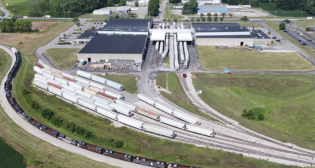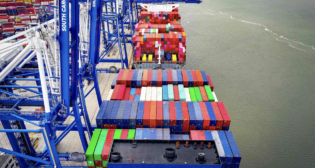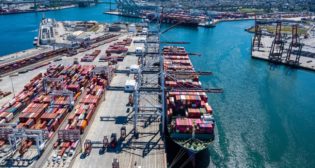
Cold Train files $41 million lawsuit against BNSF
Written by Carolina Worrell, Senior EditorThe shutdown of Cold Train, which ships fresh produce from Washington State to retailers in the Midwest via a 72-hour expedited service known as the “Z Train” service, was caused by a significant slowdown in BNSF’s service schedules on its Northern Corridor line beginning in the fall of 2013 because of increased rail congestion as a result of BNSF hauling larger volumes of oil and coal from the Northern Plains region, the company said.
According to Cold Train, from November 2013 to April 2014, BNSF’s On-Time Percentage (OTP) dropped dramatically from an average of over 90% to less than 5%. Cold Train adds that in April 2014, BNSF sent out an announcement to customers indicating that it would be immediately reducing intermodal train service from Washington to only one train a day instead of two, and that transit time would be twice as slow from Seattle/Quincy to Chicago.
“The success of this business hinged on consistent expedited rail service between the Cold Train’s intermodal terminal in Quincy, Washington and the BNSF’s intermodal ramp in Chicago,” Cold Train said.
In April 2014, BNSF canceled its 72-hour service and substituted a new 125-hour service. Cold Train claims that the service change directly resulted in the loss of Cold Train’s sale to Federated Railways Inc., leaving Lawson and Lerner with nothing from a business that had been worth over $40 million.
“BNSF intentionally interfered by preferring business from other customers over the Cold Train’s business, leading to an abysmal OTP for the Cold Train’s shipments, and most importantly by cancelling the 72-hour service from the Port of Quincy to Chicago, which effectively destroyed the bulk of the Cold Train’s business,” Cold Train said. “BNSF’s motive was to devote its trains and its tracks to a more profitable type of product being shipped.”
The lawsuit filed by co-plaintiffs Lawson of Washington and Lerner of Kansas states that “BNSF caused significant damages in an amount which is estimated to be over $40 million.”
BNSF provided Railway Age with the following response. “BNSF has not been served with the complaint, and cannot categorically comment on allegations we have yet to see. But any suggestion that BNSF would intentionally seek to cause harm to any customer runs completely contrary to how BNSF conducts business. BNSF is dedicated to customer satisfaction and growing our network to meet customer demand. BNSF did experience well documented service issues following unprecedented demand levels and historic winter weather events beginning late in 2013, but we worked to remedy those situations and regularly communicated with our customers throughout the period so that they could anticipate when service would improve and plan accordingly.”
Editor’s note: According to Railway Age Contributing Editor Bruce Kelly, BNSF downgraded its Northern Corridor premium intermodal service (Z trains) to a more moderate service (Q trains) because of the crushing delays being felt across the route due to both congestion and track projects. Crude oil and coal represent only about 10% of the traffic BNSF moves in and out of the Pacific Northwest each day. For further information, see:
https://www.railwayage.com/index.php/freight/class-i/rebuilding-an-empire.html



